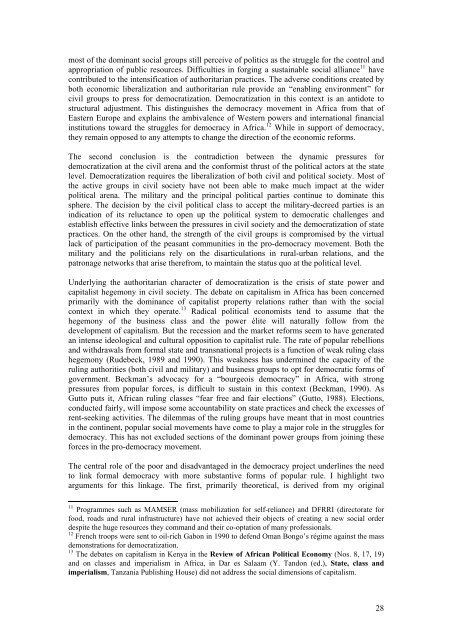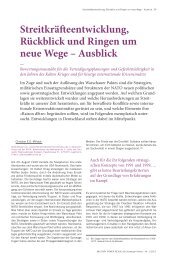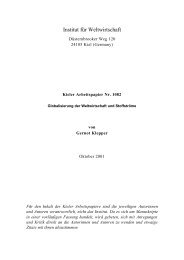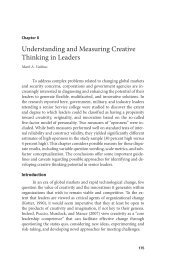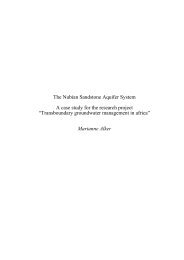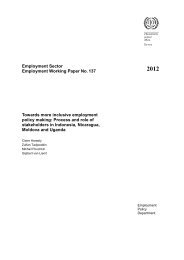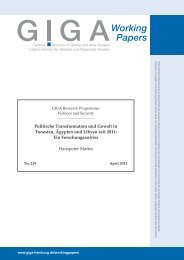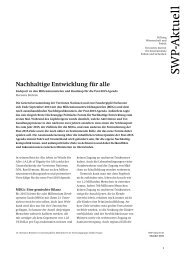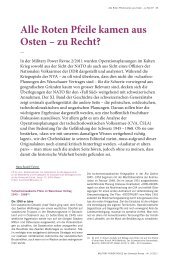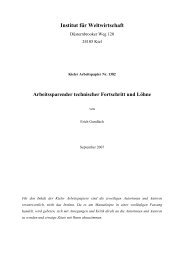Authoritarian Rule and Democracy in Africa: A Theoretical Discourse
Authoritarian Rule and Democracy in Africa: A Theoretical Discourse
Authoritarian Rule and Democracy in Africa: A Theoretical Discourse
Create successful ePaper yourself
Turn your PDF publications into a flip-book with our unique Google optimized e-Paper software.
most of the dom<strong>in</strong>ant social groups still perceive of politics as the struggle for the control <strong>and</strong>appropriation of public resources. Difficulties <strong>in</strong> forg<strong>in</strong>g a susta<strong>in</strong>able social alliance 11 havecontributed to the <strong>in</strong>tensification of authoritarian practices. The adverse conditions created byboth economic liberalization <strong>and</strong> authoritarian rule provide an “enabl<strong>in</strong>g environment” forcivil groups to press for democratization. Democratization <strong>in</strong> this context is an antidote tostructural adjustment. This dist<strong>in</strong>guishes the democracy movement <strong>in</strong> <strong>Africa</strong> from that ofEastern Europe <strong>and</strong> expla<strong>in</strong>s the ambivalence of Western powers <strong>and</strong> <strong>in</strong>ternational f<strong>in</strong>ancial<strong>in</strong>stitutions toward the struggles for democracy <strong>in</strong> <strong>Africa</strong>. 12 While <strong>in</strong> support of democracy,they rema<strong>in</strong> opposed to any attempts to change the direction of the economic reforms.The second conclusion is the contradiction between the dynamic pressures fordemocratization at the civil arena <strong>and</strong> the conformist thrust of the political actors at the statelevel. Democratization requires the liberalization of both civil <strong>and</strong> political society. Most ofthe active groups <strong>in</strong> civil society have not been able to make much impact at the widerpolitical arena. The military <strong>and</strong> the pr<strong>in</strong>cipal political parties cont<strong>in</strong>ue to dom<strong>in</strong>ate thissphere. The decision by the civil political class to accept the military-decreed parties is an<strong>in</strong>dication of its reluctance to open up the political system to democratic challenges <strong>and</strong>establish effective l<strong>in</strong>ks between the pressures <strong>in</strong> civil society <strong>and</strong> the democratization of statepractices. On the other h<strong>and</strong>, the strength of the civil groups is compromised by the virtuallack of participation of the peasant communities <strong>in</strong> the pro-democracy movement. Both themilitary <strong>and</strong> the politicians rely on the disarticulations <strong>in</strong> rural-urban relations, <strong>and</strong> thepatronage networks that arise therefrom, to ma<strong>in</strong>ta<strong>in</strong> the status quo at the political level.Underly<strong>in</strong>g the authoritarian character of democratization is the crisis of state power <strong>and</strong>capitalist hegemony <strong>in</strong> civil society. The debate on capitalism <strong>in</strong> <strong>Africa</strong> has been concernedprimarily with the dom<strong>in</strong>ance of capitalist property relations rather than with the socialcontext <strong>in</strong> which they operate. 13 Radical political economists tend to assume that thehegemony of the bus<strong>in</strong>ess class <strong>and</strong> the power élite will naturally follow from thedevelopment of capitalism. But the recession <strong>and</strong> the market reforms seem to have generatedan <strong>in</strong>tense ideological <strong>and</strong> cultural opposition to capitalist rule. The rate of popular rebellions<strong>and</strong> withdrawals from formal state <strong>and</strong> transnational projects is a function of weak rul<strong>in</strong>g classhegemony (Rudebeck, 1989 <strong>and</strong> 1990). This weakness has underm<strong>in</strong>ed the capacity of therul<strong>in</strong>g authorities (both civil <strong>and</strong> military) <strong>and</strong> bus<strong>in</strong>ess groups to opt for democratic forms ofgovernment. Beckman’s advocacy for a “bourgeois democracy” <strong>in</strong> <strong>Africa</strong>, with strongpressures from popular forces, is difficult to susta<strong>in</strong> <strong>in</strong> this context (Beckman, 1990). AsGutto puts it, <strong>Africa</strong>n rul<strong>in</strong>g classes “fear free <strong>and</strong> fair elections” (Gutto, 1988). Elections,conducted fairly, will impose some accountability on state practices <strong>and</strong> check the excesses ofrent-seek<strong>in</strong>g activities. The dilemmas of the rul<strong>in</strong>g groups have meant that <strong>in</strong> most countries<strong>in</strong> the cont<strong>in</strong>ent, popular social movements have come to play a major role <strong>in</strong> the struggles fordemocracy. This has not excluded sections of the dom<strong>in</strong>ant power groups from jo<strong>in</strong><strong>in</strong>g theseforces <strong>in</strong> the pro-democracy movement.The central role of the poor <strong>and</strong> disadvantaged <strong>in</strong> the democracy project underl<strong>in</strong>es the needto l<strong>in</strong>k formal democracy with more substantive forms of popular rule. I highlight twoarguments for this l<strong>in</strong>kage. The first, primarily theoretical, is derived from my orig<strong>in</strong>al11 Programmes such as MAMSER (mass mobilization for self-reliance) <strong>and</strong> DFRRI (directorate forfood, roads <strong>and</strong> rural <strong>in</strong>frastructure) have not achieved their objects of creat<strong>in</strong>g a new social orderdespite the huge resources they comm<strong>and</strong> <strong>and</strong> their co-optation of many professionals.12 French troops were sent to oil-rich Gabon <strong>in</strong> 1990 to defend Oman Bongo’s régime aga<strong>in</strong>st the massdemonstrations for democratization.13 The debates on capitalism <strong>in</strong> Kenya <strong>in</strong> the Review of <strong>Africa</strong>n Political Economy (Nos. 8, 17, 19)<strong>and</strong> on classes <strong>and</strong> imperialism <strong>in</strong> <strong>Africa</strong>, <strong>in</strong> Dar es Salaam (Y. T<strong>and</strong>on (ed.), State, class <strong>and</strong>imperialism, Tanzania Publish<strong>in</strong>g House) did not address the social dimensions of capitalism.28


